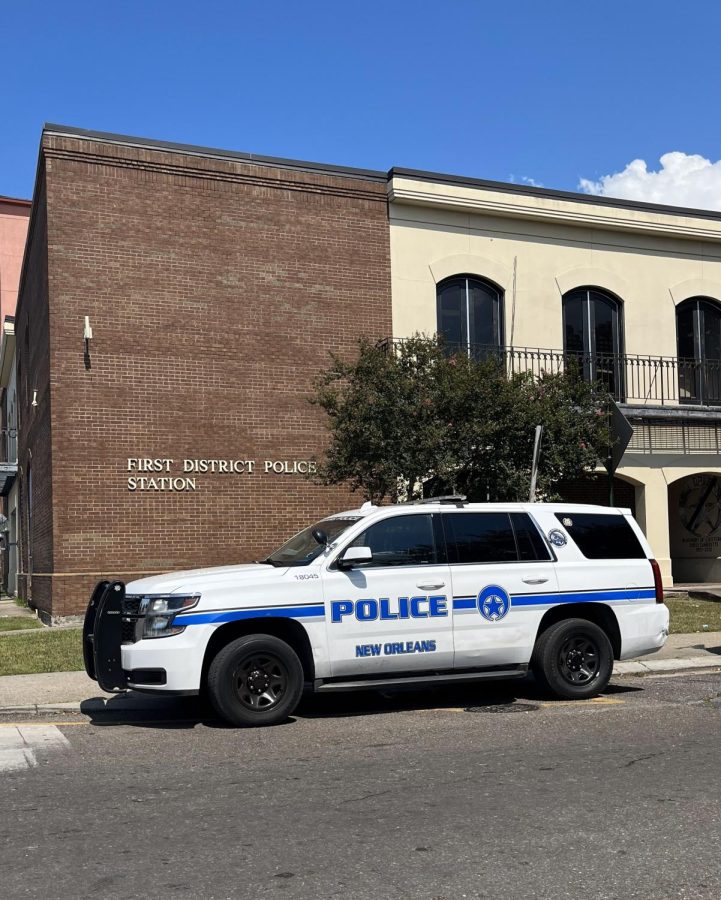Former superintendent speaks on the search process for new NOPD chief
A police cruiser is parked in front of NOPD’s first district police station.
March 9, 2023
Amidst a mayoral recall effort, crime surge, what many have said is an understaffed police force, and unstable mayoral city council relations within the city, the search for a permanent police chief could be difficult, according to former superintendent Ronal Serpas.
As the city stands, Michelle Woodfork has served as interim police chief for three months now, following the resignation of former superintendent Shaun Ferguson in 2022, and her contract is set to expire in April.
Serpas, who was superintendent of the New Orleans Police Department for four years before coming to Loyola to teach criminology in 2014, said that it can be difficult to be an interim chief.
“When there’s an interim CEO, there tends to be inertia, so that’s something superintendent Woodfork can’t control,” he said.
Woodfork previously worked in NOPD’s Management Services Bureau, and also headed the alternative police response unit after being promoted by Serpas while he was superintendent.
She is the first Black woman to serve as superintendent, with her uncle, Warren Woodfork, being the first Black man to hold the position from 1985 to 1991. It is uncertain whether or not Woodfork will assume the position permanently.
The city chose the International Association of Chiefs of Police to lead and conduct a search for the next NOPD superintendent back in late January, which they said would take 15 to 17 weeks once it began. The city said the search was expected to begin in February of this year, but nothing has been said publicly about if that was the case.
“Right now, whether it be Woodfork or whomever, New Orleans needs stability,” Serpas said. “Not having stability is adding to the complications of the problems that are being experienced by the people throughout the city who are being robbed, raped, murdered, shot, survived shootings, died from shootings, don’t feel safe with their children going to college, don’t feel safe going to stores – it’s just, stability is what’s needed to start forging a path forward.”
Part of that path forward includes a qualified permanent police chief. Serpas said whoever would be the successful candidate should be someone who has already been a police chief in a reasonably sized city.
“New Orleans is not a place where now would be the best time to take a chance on someone who has not had an opportunity to show significant senior-level leader experience,” he said.
Serpas related the search process for a new superintendent to the search process a university goes through for a president, such as Loyola’s current situation.
“Is the president of the university going to be someone who has never been a president before? Of course, that’s gonna happen sometimes. But if you’re a university that’s in crisis or you’re a police department in crisis, right now is probably when you wanna find somebody who has already demonstrated the chief executive officer experience necessary to translate that into what the city needs,” he said.
Serpas said he has been a chief who was externally chosen several times and also worked to choose chiefs. There are three major areas that potential applicants to the position will be looking at.
“Candidates are looking, first and foremost, at the reality of the community they are going into. What’s the mayor’s position in relation to the community? What’s the mayor’s position relative to the council? Candidates think about these things because that’s where the resources come,” Serpas said.
After that, Serpas said candidates look at the status of the department.
“What’s its staffing level? What are the technology advantages and challenges? What are the recruitment and retention challenges and advantages?” he said.
Then, they consider weaknesses in crime reduction.
“Are there failings of detective function? Are there failings of reactive policing versus proactive policing?” Serpas said.
With all of these considerations in mind, Serpas said New Orleans might not look stable to many potential candidates.
“To come to New Orleans today, you don’t have a stable mayor, you don’t have a stable community, you don’t have a stable council relationship with the mayor, so I think those would be very significant distractions for candidates right now who would want to take the big leap to be in the place for you to have to make bold changes,” he said.
This begs the question: what type of candidate would be drawn to head a department for a city in crisis?
“On a personal level, I returned to New Orleans in 2010 because it exactly was a police department crisis,” Serpas said. “It was my hometown, and I wanted to be part of the reformation of the organization. Brand new mayor, brand new police chief, brand new city council. An absolute focus by everybody at the federal, state, and local levels that we were gonna make changes in the New Orleans Police Department. That was enticing to someone like me who had been a chief for 12 years, ten years, or whatever it was.”
Woodfork didn’t respond to The Maroon’s multiple phone and email inquiries.








